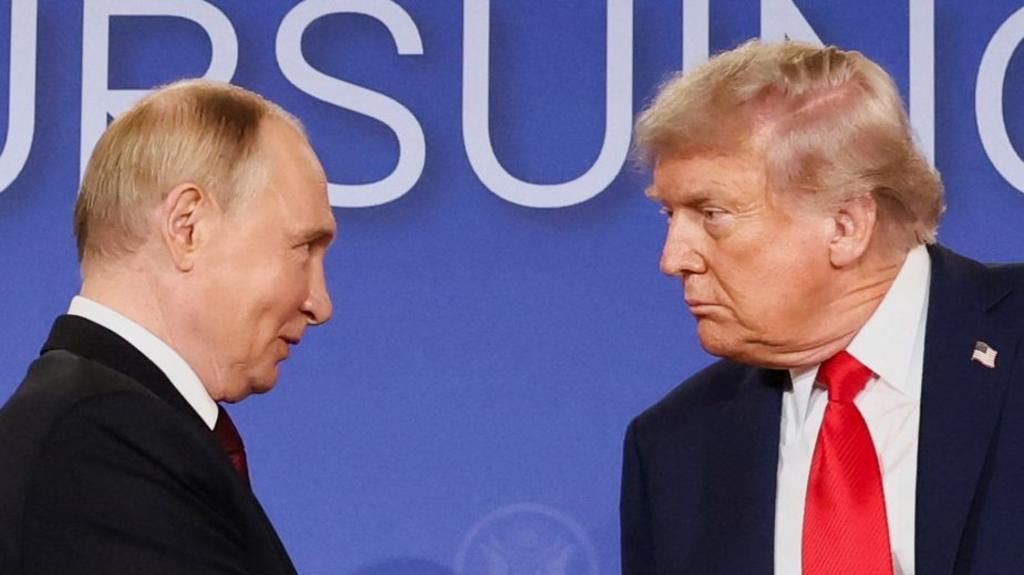A special envoy for Donald Trump has stated that Russia has consented to allow the United States and Europe to provide Ukraine with “robust” security guarantees as part of a potential peace agreement.
Steve Witkoff told CNN that an agreement was reached at the Alaska summit, permitting the US and Europe to “effectively offer Article 5-like language to cover a security guarantee,” referencing NATO’s principle of collective defense.
President Putin has long opposed Ukraine’s accession to NATO, and Witkoff suggested that this arrangement could serve as an alternative if the Ukrainians find it acceptable.
Prior to discussions with Trump and European leaders on Monday, Ukrainian President Volodymyr Zelensky characterized the US security guarantee offer as “historic.”
Speaking ahead of his visit to Washington D.C., Zelensky stated that any guarantee “must really be very practical, delivering protection on land, in the air, and at sea, and must be developed with Europe’s participation.”
Following a Sunday meeting of the “coalition of the willing” – a group including the UK, France, and Germany, which have pledged to protect peace in Ukraine once achieved – a No. 10 spokesman said leaders had commended Trump’s “commitment” to providing security guarantees.
The leaders also “re-emphasised the readiness to deploy a reassurance force once hostilities have ceased, and to help secure Ukraine’s skies and seas and regenerate Ukraine’s armed forces,” the spokesman added.
UK Prime Minister Sir Keir Starmer, French President Emmanuel Macron, German Chancellor Friedrich Merz, European Commission President Ursula von der Leyen, and NATO Secretary-General Mark Rutte are scheduled to join Zelensky in Washington on Monday.
Macron indicated that the group would challenge Trump regarding the extent of his commitment to security guarantees.
“If we’re not strong today, we’ll pay dearly tomorrow,” he said, adding the group’s plan was to “present a united front.”
Witkoff also told CNN on Sunday that Russia had made “some concessions at the table” regarding territory, noting Donetsk would be part of an “important discussion” on Monday.
This follows reports that Putin presented Trump with a peace offer in Alaska on Friday that would require Ukraine to withdraw from the Donetsk region of the Donbas, in return for Russia freezing the front lines in Zaporizhzhia and Kherson.
CBS, the BBC’s US partner, cited diplomatic sources as saying that European officials were concerned Trump might pressure Zelensky to agree to the terms.
Russia claims the Donbas as Russian territory, controlling most of Luhansk and approximately 70% of Donetsk. It also illegally annexed the Crimean peninsula in 2014, eight years before launching its full-scale invasion of Ukraine.
Zelensky stated on Tuesday that Ukraine would reject any Russian proposal to cede the Donbas region, warning it could be used as a springboard for future attacks.
He has also referenced the country’s constitution, which mandates a referendum before any territorial changes.
Monday’s White House meeting will be Zelensky’s first since a contentious public exchange in the Oval Office in February, during which Trump told him to be more “thankful” for US support and accused him of “gambling with World War Three.”
Zelensky was subsequently asked to leave the White House.
He appeared to reconcile with Trump in April, in what the White House described as a “very productive” 15-minute meeting before they attended Pope Francis’s funeral.
Ukraine has also signed a minerals deal that provided the US with a financial stake in the country, and Kyiv has indicated its willingness to pay for US arms.
However, the Trump-Putin meeting on Friday has likely raised concerns in Kyiv and other European capitals.
The Russian president, who is facing an International Criminal Court arrest warrant for alleged war crimes in Ukraine, was warmly received by Trump upon arrival, with Trump later stating they have a “fantastic relationship.”
Washington residents have protested against Trump’s deployment of troops in the city.
Guernsey and Jersey collectively sent more than 8,500 boxes across Eastern Europe last year.
The State Department announcement came after a right-wing activist criticised the programme.
DC’s largest homeless encampment was destroyed after the president called for a crackdown. What happened to its residents?
The US president demanded a ceasefire before he met Putin. His change of mind flies in the face of what Europe and Ukraine want.

